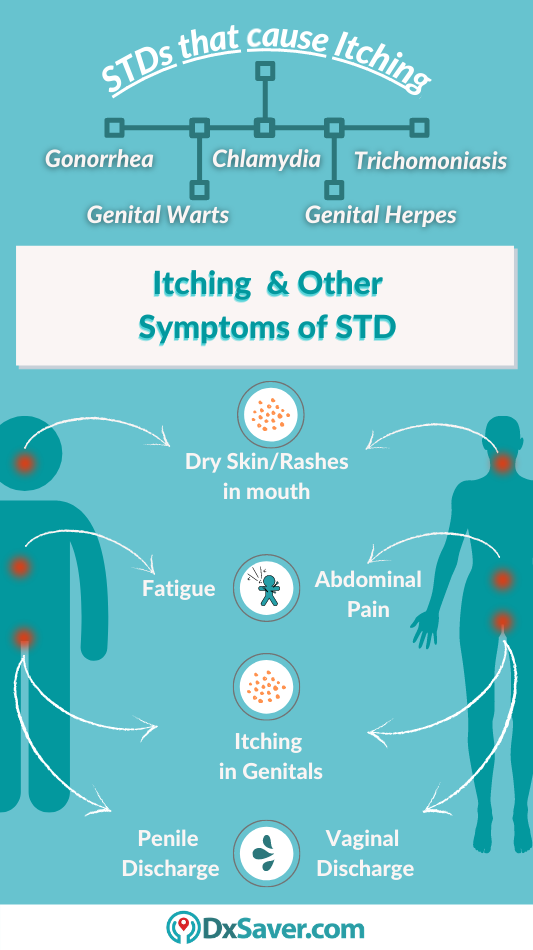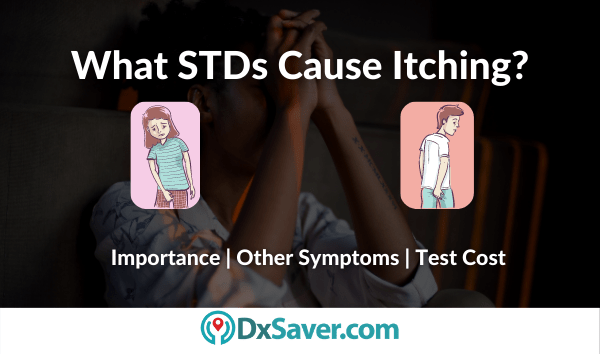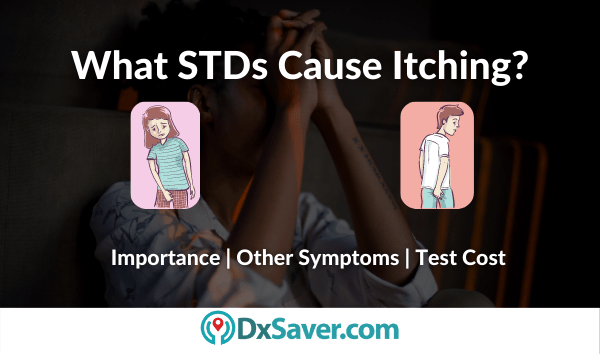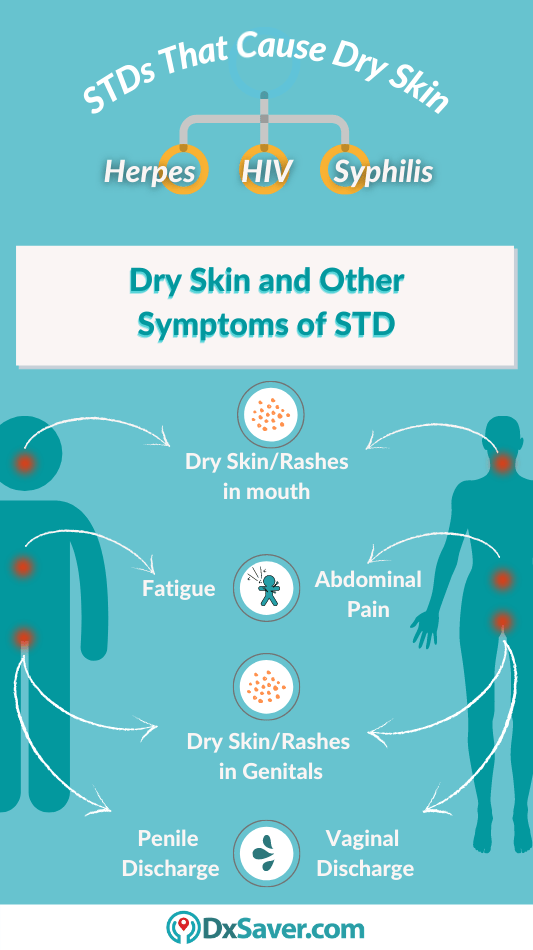Sexually Transmitted Diseases (STDs) can cause various symptoms including itching, burning, vaginal/penis discharge, or pain. In this article, we cover the details of STIs or STDs that cause itching. We discuss other symptoms and testing options too.
The STDs that are most likely to cause itching are Chlamydia, Gonorrhea, Herpes, Trichomoniasis (Trich) and Genital Warts (HPV).
If you have itching and other symptoms of the above diseases, and you suspect that you may have been exposed to any STD, then timely diagnosis and treatment is crucial to avoid more severe, potentially life-threatening, health problems.
Do STDs cause itching?
STDs are diseases that are contracted from unprotected sex. STDs can cause itching and burning sensations in both men and women, especially in the genital areas.
The STDs that cause itching as one of the main symptoms are Chlamydia, Gonorrhea, Herpes, Trichomoniasis, and Genital Warts (HPV).
Besides the itching and burning symptoms, STDs show various other signs. The most commonly reported symptoms of STDs in women are yellowish vaginal discharge, pain during sexual intercourse, lower abdominal pain, and heavy menstrual periods. Men with an active STD can be identified by symptoms like thick penile discharge, irritation inside the penis, burning sensation while urinating, anal itching, and swollen testes.
Common symptoms in both sexes may include fever, skin rash, redness/dry skin, headache, weight loss, sore throat, joint pain, and diarrhea. Luckily, most STDs are curable if diagnosed and treated at an early stage.
Book STD package covering Chlamydia, Gonorrhea, Herpes and Trich
If you are looking to get tested for these STDs that cause itching, we recommend STDcheck. STDcheck stands out amongst STD diagnostics companies and we have referred many of our readers to them. They key reasons we recommend STDcheck are:
- 100% Confidential STD Testing
- 5 Minute Testing with Results in 1 to 2 days
- All Tests are FDA-Approved / Cleared
- Same Day STD Testing Available
- Over 4,500 Testing Centers Nationwide
You can click on the photo given below or the link to go the STDcheck online website and book an individual test or a full package. We recommend a full package if itching is one of the symptoms and you have been exposed to STD transmission lately. The full package turns out to be more economical than individual tests.
STDs and Genital Itching
Many people ask whether itchy symptoms down there or between the thighs are a symptom of STDs. The answer is yes, anal and/or genital itching can be a symptom of a sexually transmitted disease (STD). It’s the most common and irritating symptom of gonorrhea and anal herpes, which are some of the most commonly reported types of STDs in the US.
Itch causing gonorrhea STD is caused by a bacteria called “Neisseria Gonorrhoeae”. Gonorrhea infection can be transmitted from one person to another through almost any kind of sexual contact, including anal sex.
On the other hand, herpes is caused by a virus named the “Herpes Simplex Virus” (HSV). Herpes virus is of two types – HSV1 and HSV2. Herpes can cause serious itching in the anal opening and around the genitals. It can be spread by sexual intercourse with someone infected by the herpes virus, especially if they have active herpes sores on their skin.
Always remember that itching could be caused by more benign reasons too. Some kind of skin conditions or just by contact with some irritant hygiene product or a new variety of toilet paper. Check for the other symptoms of the STDs that are listed in this article. Itching and some of the other symptoms point to the possibility of the STD. And of course, the recent history of exposure to STD has to be considered which you already know about.
What are the Types of STDs that Cause Itching and/or Burning?
There are more than 20 different types of STDs caused by microorganisms like bacteria, and viruses. Not all Sexually Transmitted Diseases cause itching or dry skin symptoms. Following are the 5 STDs that cause itching and burning symptoms:
- Chlamydia
- Gonorrhea
- Genital herpes
- Trichomoniasis
- Genital warts (HPV)
All the above STDs may also cause reddish sores and dry skin rashes that can be itchy. It may also cause pus or other discharge. STDs need to be diagnosed and treated at the earliest, if untreated, the infection can increase your risk of acquiring other severe diseases.

STDs that Cause Itching: Chlamydia
According to a study conducted by the Centers for Disease Control and Prevention (CDC), Chlamydia is the highest reported STD infection in the United States. It is caused by a bacterium called “Chlamydia Trachomatis” which infects the genital tract in both men and women. This bacteria can also form in your mouth and cause a sore throat if you have engaged in oral sex with the infected person.
Itching, burning sensation while urinating, lower abdominal pain, bleeding between periods in women, testicular pain in men, and penile/vaginal discharge are the most common symptoms of chlamydia STD.
STDs that Cause Itching: Gonorrhea
Gonorrhea is another STD that causes itching. Gonorrhea is caused by a bacteria called “Neisseria Gonorrhoeae” that affects your genital tract. This bacteria can also grow in your mouth, throat, eyes, and anus. Following are some of the other symptoms that generally appear within 10 days after exposure:
- Anal/Genital itching
- Pain or burning sensation when urinating
- Heavy menstrual bleeding or bleeding between periods
- Painful, swollen testicles
- Painful bowel movements
- Thick, cloudy, or bloody discharge from the penis or vagina
STDs that Cause Itching: Herpes
Herpes infection is a highly contagious infection. This is caused by a virus called herpes simplex virus (HSV). The HSV virus enters your body when you have sexual contact with an infected person. Herpes infection doesn’t show any symptoms in the early stage of the infection. By the time the symptoms show up, it is the severe stage of the disease. Hence, if you believe you have had exposure, it is best to check for Herpes even before the symptoms are visible.
Herpes STD causes itching and open sores and small red bumps in the genital and anal areas and around the groin. Other symptoms of Herpes STD include pain or itching around the buttocks and inner thighs, headache, muscle aches, fever, and swollen lymph nodes in your groin. In some cases, the herpes virus can be active and contagious even when sores on the genital areas aren’t present.
STDs that Cause Itching: Trichomoniasis
According to the latest study in the US, an estimated 3.7 million people are infected with trichomoniasis. Trichomoniasis STD is caused by a microscopic, one-celled parasite called “Trichomonas Vaginalis”. This parasite spreads during sexual intercourse when you have sexual contact with someone who already has the infection. Trichomoniasis causes itching in both men and women. It also affects the urinary tract in men and the vagina in women.
Following are some of the other symptoms of trichomoniasis infection:
- White, greenish, or yellowish vaginal discharge
- Discharge from the penis
- Strong vaginal odor
- Itching or irritation inside the penis
- Pain during sexual intercourse
- Painful urination
- Vaginal itching or irritation
STDs that Cause Itching: Genital Warts (HPV)
Genital warts are caused by a virus called “Human Papillomavirus (HPV)”. Warts are small flesh-like, skin-colored, or somewhat darker growths, that develop around the genitals or anus, thus called genital warts. Typically, they are smaller than 5 mm. There is no cure for HPV infection. However, these warts can be removed and the disease managed.
Genital warts grow on the skin and mucous membranes in the genital or anal area.
- In men, warts can be seen on the penis, scrotum and anus.
- In women, warts may develop on the vulva, the internal surface of the vagina, the cervix and anus.
Genital warts do not cause any pain, but they can cause itching, redness, or discomfort, and sometimes, bleeding may occur from them.
Does HIV cause Itching?
Human Immunodeficiency Virus commonly known as HIV is a virus that attacks the body’s immune system and spreads via sexual intercourse. If HIV is not addressed at an early stage, it can lead to AIDS (acquired immunodeficiency syndrome), where the white cells are completely damaged and your body is prone to diseases like cancer, liver cirrhosis, and more. Generally, HIV infection does not cause itching, however, it can cause skin rashes.
Does Syphilis cause Itching?
Syphilis is a bacterial infection that affects your genitals, skin, and mucous membranes, but it can also involve many other parts of your body, including your brain and your heart. Initially, a small, painless sore may be present at the site of infection, usually the genitals, anus, tongue, or lips.
As the infection spreads, skin rashes and/or mucous membrane lesions (sores in the mouth, vagina, or anus) tend to occur. Skin rash is characterized by red or reddish-brown, penny-sized sores over any area of your body, including your palms. These rashes caused by syphilis STD do not cause any itching sensations. Other syphilis symptoms include fever, enlarged lymph nodes, fatigue, and a vague feeling of discomfort, soreness, and aching.
How are STDs treated?
Bacterial STDs can be treated with antibiotics if treatment begins at an early stage. Unfortunately, viral STDs like HIV cannot be cured, but you can control symptoms with daily medications. If you are given antibiotics to treat STD, you should take all of the drugs prescribed by your physician, even though you may stop showing symptoms. Also, avoid taking someone else’s medication to cure your infection; this may lead to severe difficulties later.
If you suspect your partner of having STD-related itching and other symptoms, you must insist on your partner getting tested. This way you can protect yourself and start diagnosis for your partner at an early stage avoiding major health complications.
Get tested for STDs
Please click on the button below to go to STDcheck website and book your STD testing. All your questions will also be answered on their website.










